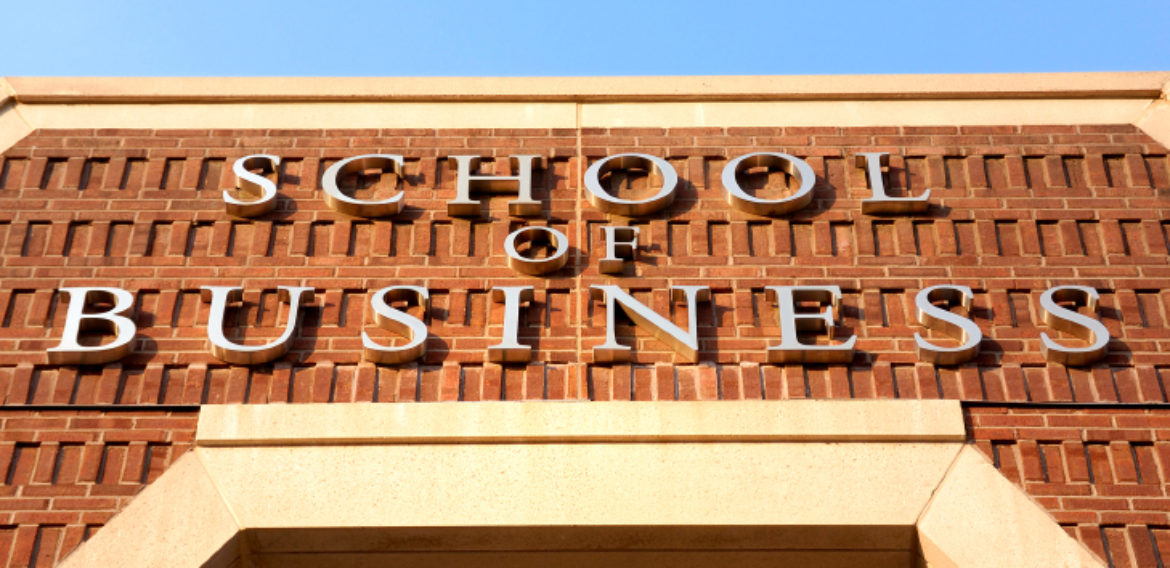Understanding the Business School Industry and Its Effect on MBA Applications
Guest Post- Admissionado
As MBA admissions consultants, we occasionally come across applicants who explain that they are interested in an MBA so that they can “make the world a better place through social impact” or “engage in action-based learning in a diverse, experiential environment.” These particular agglomerations of buzzwords are sure symptoms of a person who has ingested far too much MBA marketing material. If you were to show a visitor from another planet an MBA admissions website, she would come away thinking that business schools are all about double bottom lines—not just profit, but also Diversity, Inclusion, Education, the Good and other Important Nouns. Nothing could be further from the truth.
A business school, more than any other type of school, is first and foremost a BUSINESS. Understanding this fact and the current state of the B-school industry is the key to a successful MBA experience.
We’ve been saying business schools are all about the money for years, but a recent Wall Street Journal article provides timely evidence. In the article, journalist Kelsey Gee describes how some low-ranked business schools are shuttering their traditional full-time MBA programs in the face of declining enrollments. It’s all about “creating leaders of the future” until the margin takes a hit! Facing pressure from a strong job market, online programs, millennials’ smaller pocketbooks, and America’s tarnished international reputation, two-year MBA programs outside the top 30 are under a lot of financial pressure. More and more B-schools are wondering why they don’t just skip the prestigious two-year MBA (always something of a loss leader) and focus on more profitable (and increasingly more popular) offerings like Online MBAs, Executive MBAs, Masters in Management and Masters of Finance.
What does this mean for potential MBA applicants? First, if you’re at all interested in an MBA, now is a good time to “buy low.” An MBA, like Tupperware, camping equipment and low-end cars, sells best during a recession. Today’s tight labor market and low unemployment means that many potential MBA applicants have comfortable, hard-to-leave jobs and are under little pressure to improve their employment prospects. The question in 2009 was “Will I get my MBA application in before they shut down my division?”; but in 2019 it’s “Why leave when I’m making all this money?”
Of course, this comfortable mentality works right up until the next economic downturn. When the labor market once again swings in employers’ favor, the applicant who got her MBA when times were good has a distinct advantage against the applicants who didn’t. Folks with an eye toward the big picture (or the inverted U.S. yield curve) can take advantage of today’s smaller applicant pool to get into a higher-ranked program. Once you have an elite brand like Harvard or Wharton on your resume, it’s there forever. No hiring manager 20 years from now is going to think “yeah he went to Stanford, but acceptance rates were higher that year because of the strong economy.”
If you do decide to apply this season, keep B-school’s economic imperatives in mind while writing your MBA application. If you were an admissions committee member at a full-time MBA program in this tough environment, what kind of applicant would you be looking for? It may seem cynical, but: the lucrative ones! One obvious way to put cash in adcoms’ pockets is to pay full tuition, and while many lower-ranked programs are need-conscious, top programs can afford to think longer term. Harvard isn’t looking for the kind of applicant who will pay them the full $72,000 for two years. That’s small potatoes. They’re looking for the guy who will donate $7.2 million in 2050.
How can you prove that you are that guy? A name-on-a-building, endowed professorship, Forbes cover kinda guy? Well, a cool anecdote about the time you saved eight children from a burning building isn’t going to be enough by itself. Simply to safeguard their own existence, MBA adcoms need evidence that you will positively impact their BOTTOM LINE. They need to be convinced that you are not a risky bet, that you will achieve your goals, and that you stand to make a lot of money in the future. Do that by getting specific about your future business plan. It’s not “I want to go into private equity,” it’s “I want to work in XYZ fund, in ABC division, where I’ll apply DEF new and interesting strategy. In fact, I’ve already made contact with the manager, Mr. Smith, who just happens to be an alumni from your school!”
Applicants often feel a lot of pressure while working on their application, but they rarely consider the pressure their counterparts in the MBA administration are under. We’re here to tell you that, given 2019’s MBA market, your adcom member is feeling the heat too. The business school industry needs more customers, and that makes now a perfect time to apply.
About Admissionado
Admissionado (www.admissionado.com) is an elite admissions consulting firm. Quite simply, we help applicants gain admission to top undergraduate and graduate programs worldwide. As competition increases year after year, so too does the need to stand out from the rest of the pack. Competitive test scores and top ranks no longer secure admission. Applications need to resonate.
We are diagnosticians. We assess each candidate’s profile. By asking the right questions, we begin an ongoing process of constructing a picture of the candidate. Over time, through targeted feedback on written work as well as ongoing high-level strategy sessions, we help candidates develop sharp, memorable applications that they can submit with confidence.


